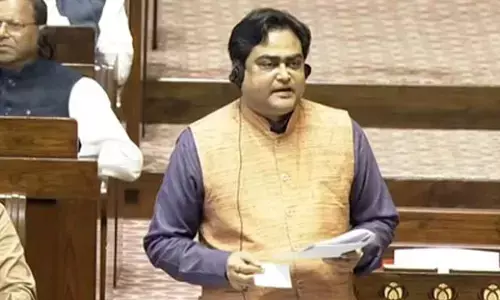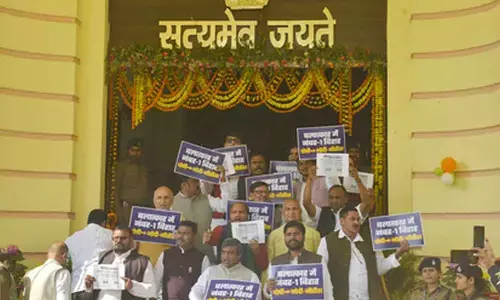Is India's Move To Relax MTP Period, Woman Friendly?

No woman can call herself free who does not own and control her body.
"No woman can call herself free who does not own and control her body. No woman can call herself free until she can choose consciously whether she will or will not be a mother." - Margaret Sanger
Your body, your rules— what would any pro-choice person say about mentioning the word abortion. And, no-one else should have it. Also. Day: Period.
Pro-choice has come to the fore once again as the Indian government amended the Legal Termination of Pregnancy Act (MTP) 1971 on January 29, this year, to relax the rules on abortion. The amendment in the Act has the nod of the Cabinet to extend the upper limit on abortions from the earlier The 20-week threshold to 24 weeks and is expected to be discussed in the current the session before the Parliament.
special categories of women
This is going to reduce maternal mortality," said Union Minister Prakash Javadekar when addressing the issue to the media. Unsafe abortion continues to be the third-largest cause of maternal mortality in India, and as a result of this, there is an urgent need to prevent death and disability suffered by women, a Ministry of Health & Family Welfare research report noted in February 2015.
Additionally, the gestation limit has been extended for' special categories of women,' including' vulnerable women including rape survivors, incest victims and other vulnerable women (such as women of different abilities, minors), etc.'
extended cap on abortions
The expanded limit on abortions would allow survivors of rape and other vulnerable women to terminate their pregnancies up to 24 weeks after launch. For the rule, though, that has been valid since 1971, only a four-week extension can't be celebrated as a genteel effort to be a pro-choice society.
Example Of The Daughter of 10 Years
Recall the 2017 Chandigarh rape survivor's heart-wrenching case, whose abortion plea was rejected by the Supreme Court for missing the 20-week deadline? She had given birth to a premature baby at the tender age of 10 in August 2017. "The girl didn't know she had delivered a boy. Her parents told her she's got a stone in her stomach and she's got to be handled for that. Her father had asked the hospital authorities to put the newborn up for adoption.
The survivor had been pregnant at about 21 or 22 weeks when her family approached the High Court, pleading for abortion. Following HC's dismissal of the plea, the family banged the Supreme Court's doors. By then, she was pregnant for 26 weeks; and she had crossed 32 weeks by the time the apex court finally turned down their plea. Abortion of the fetus would have been fatal to her life by that time, and also to the child. "The baby has earned the right to live at some stage of pregnancy," Dr. Vanita Suri, then-head of obstetrics and gynecology at Chandigarh's Post-Graduate Institute of Medical Education and Research, told The New York Times. If this is not a clear case of negligence on the part of the system that has continued to delay something this crucial — related to the whole life of a 10-year-old, and that of another life.
What about the attitude, that prejudice, the constant badgering and judgmental appearance given to women or girls seeking an abortion, too. In February 2018, a parliamentary panel told the houses that around 80 percent of Indian women believe abortion in India is illegal. This is a clear indication of a lack of awareness about maternal health, women's rights and reproductive rights for women.
Those who were fighting for abortion rights and reproductive rights want the deadline for rape survivors to be completely abolished. "When it's a rape result, even if it comes at 32 weeks, she must get an abortion and not have to go to court. Everything should be done to ensure that access is given, "told the Thomson Reuters Foundation Sangeeta Rege of the Center for Health and Allied Research in Mumbai, a medical charity.
Condoms can be blamed!
While we are still thinking about women's reproductive rights did you know that unmarried women were not allowed to terminate their pregnancy due to birth control failure (naturally after the 20-week limit!)? Until the amendments are lawfully brought into force by Parliament, the MTI Act recognizes "contraceptive failure" and "unplanned pregnancy" only as legal reasons for abortion only for married women
Multiple Medical Opinions
Another caveat in the proposed amendments is that women are now required to consult two medical experts instead of a medical practitioner's opinion to terminate a pregnancy between 20-24 weeks. If a woman wishes to terminate her pregnancy before 20 weeks, as required by law, one health care practitioner's opinion is required. Think of this trap in the amendments, and thinking of rural oppressed Indian women who are already dealing with a lack of awareness of freedom, employment, sanitation, and lack of medical care. How will these women abide by the current requirements of the law!
It is also necessary to take permission from a medical board, local- or state-recognized, to terminate a pregnancy between 20-24 months due to fetal abnormalities.
Legally, as the archaic law still governs the bodies of women, we need to understand the importance of the autonomy of a woman, her freedom and her right over her body. Just because women are endowed with reproductive abilities, the world needs to take a back seat and allow women to be the decision-makers for something that affects their bodies directly life choices and everything else in their world.














